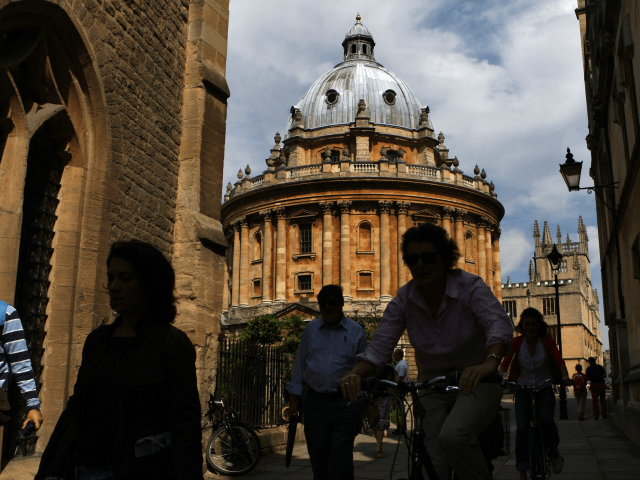The University of Pennsylvania (UPenn) and the Rhodes Trust are reportedly investigating a graduate student who won a prestigious Rhodes scholarship to study at Oxford after she was accused of being “blatantly dishonest” about her life struggles — which schools encourage students to write about on their applications.
In the fall of 2020, University of Pennsylvania graduate student Mackenzie Fierceton had been selected as a Rhodes scholar — just one of 32 scholars chosen from more than 2,300 applicants — but soon after found herself addressing accusations that she had been “blatantly dishonest” about her childhood in her UPenn and Rhodes applications, reports the Chronicle of Higher Education.
On her application, Fierceton had characterized herself as a “low-income, first-generation woman” with a history of family abuse.
And when her Rhodes Scholarship was announced, the Philadelphia Inquirer profiled her, noting that she “grew up poor, cycling through the rocky child welfare system,” and had “bounced from one foster home to the next.”
After that, however, UPenn received an email from an anonymous accuser, claiming that Fierceton had grown up in an affluent suburb of St. Louis, Missouri, with her mother — who was a radiologist — and had attended private schools.
The Rhodes Trust received a similar email accusing Fierceton of being “blatantly dishonest in the representation of her childhood.” The email also included photos of Fierceton skydiving, riding a horse, and whitewater rafting.
The emails eventually sparked two investigations — one by the university, and one by Rhodes. The situation also exposes how universities appear to be in pursuit of applicants with tragic backgrounds.
College consultants who spoke with the New York Post about the matter added that the college application process now features more questions about overcoming obstacles.
“There are a lot of pressures out there for applications right now,” Marco Santini, a New York-based college education consultant, said. “I always try to tell students not to do the sob story because there is always someone with a sadder story.”
“I tell students that when they submit their application, they have to make sure that everything they have said in their personal statement is true — that they have to stand by what they wrote,” Santini added.
Fierceton lived with her mother, Carrie Morrison — a divorcée and director of breast imaging and mammography at a nearby hospital — in “a suburb west of St. Louis, on a tree-lined cul-de-sac with large houses and well-groomed lawns,” according to the Chronicle.
She also attended Whitfield, a small, private, nearly $30,000-per-year college preparatory school in St. Louis with a student-teacher ratio of eight to one.
After the university received the anonymous accusations about Fierceton, the student was questioned in the fall of 2020 by UPenn deputy provost Dr. Beth Winkelstein, reports the Chronicle.
While no one disputes that Fierceton spent nearly a year in foster care, Winkelstein nonetheless said in a letter to the Rhodes Trust one week after her meeting with Fierceston that it was “evident from multiple sources” that the student had “constructed a narrative regarding her childhood.”
The letter also stated that Fierceton had been raised in an upper-middle-class household and had attended a private high school, as well as pointed out that her mother is a radiologist, and that her grandfather was a college graduate.
“We have concluded that there is a basis for serious concern and that further investigation by the Rhodes Committee may be appropriate,” Winkelstein wrote to Rhodes Trust CEO Elizabeth Kiss.
The Rhodes Committee then conducted its own probe in April 2021, and questioned Fierceton about the essay she wrote when applying to UPenn.
In her essay, Fierceton reportedly noted a time her mother allegedly pushed her down a set of stairs and hit her in the face. The student detailed a hospital stay she had after one of the alleged incidents, in which she claimed that her hair was “caked with dried blood,” and her “facial features so distorted and swollen that I cannot tell them apart.”
The committee, however, concluded that these descriptions of her injuries were “inconsistent with the hospital records,” and that “either [Fierceton] has fabricated this abuse by her mother, or her mother has lied about the terrible abuse.”
But Sherry McClain, one of the nurses assigned to Fierceton that day, told the Chronicle that the student’s story “could very well be more exaggerated than it was,” but added that it was nonetheless “legit.”
“I would never go to bat for somebody who I thought was making something up,” McClain said.
Nevertheless, UPenn and Rhodes both concluded that Fierceton was not fully honest about her background in her essay. The university also called the student’s claim that she was “first generation” on her application “objectively inaccurate.”
Fierceton was supposed to graduate with her master’s last May, but UPenn is reportedly withholding her degree pending the final outcome of its disciplinary process. The Rhodes Trust also confirmed to the Chronicle that Fierceton withdrew from the program.
Last month, Fierceton filed a lawsuit against UPenn, accusing the university of conducting a “sham investigation.” The suit also claims that UPenn unfairly withheld her master’s degree, and wrote a “secret letter” to Rhodes in an attempt to discredit her.
Moreover, Fierceton does not appear to have many regrets about the essays she had submitted.
After being asked by the Chronicle about whether she would change her essays or remove certain information from them, Fierceton said, “Where I’ve landed is that I have a right to write about my experiences as I experienced them. Period.”
You can follow Alana Mastrangelo on Facebook and Twitter at @ARmastrangelo, and on Instagram.

COMMENTS
Please let us know if you're having issues with commenting.